“The truth will set you free, but first it will piss you off.”
Gloria Steinem
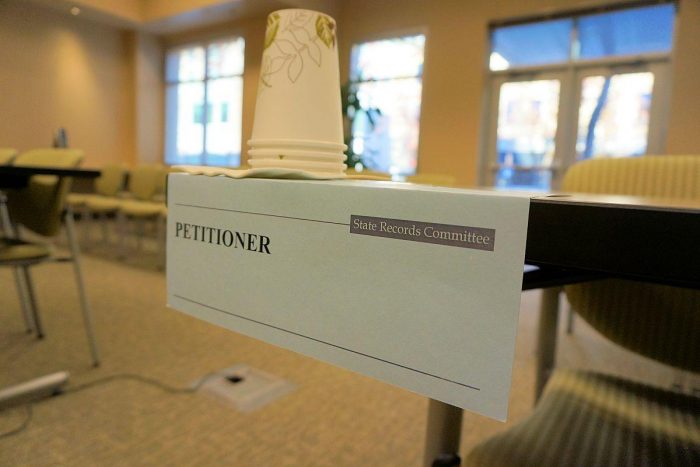
San Juan County comprises a splendor of canyons, cliffs and castles of sandstone. Anyone who has made a random discovery of 1,000-year-old artifacts of human habitation, trekked to the top of a Canyonlands National Park overlook at sunset or spent a deathly silent, crystalline night starring at the canopy of Creation can attest to its unearthly beauty.
It’s also a political swamp that heightens the risk of irreversible damage to an irreplaceable landscape.
Representative government in the county, which will play a critical role in the future of that irreplaceable landscape, seems intractably bogged down by ideological dissembling, undemocratic “outside influences” accountable to no voter, opaque tribal politics, secret agendas, suspicion, lawyers and judges making public policy and environmental profiteers.
It’s fascinating in a demented way. So I waded in.
A little over four months ago I filed a records request under Utah’s Government Records Access and Management Act, or GRAMA, as part of an effort to gather information for a book proposal on environmental politics and communication strategies behind creation of Bears Ears National Monument.
It seeks insight into governing priorities of two recently elected San Juan County commissioners as they prepared to take office. Were the policies of those pro-Bears Ears commissioners preordained to align – in varying degrees – with the goals of a grand alliance of environmentalists, tribal activists and outdoor recreation companies that gave them a national platform for their advocacy? Were the needs of a desperately poor county put on the back burner as a result?
I won an appeal to the State Records Committee on June 13. The panel ordered the county to allow me to take a peek at relevant records, but the process hasn’t been a cakewalk and it’s far from over. The request flowed through the GRAMA pipeline to the San Juan County clerk, the county’s GRAMA appeals officer and an attempt at voluntary mediation.
Newly elected commissioners Kenneth Maryboy and Willie Grayeyes stonewalled at every stage. They’ve given me, their constituents, other duly elected San Juan officials and even the idea of transparent representative democracy an old-fashion Bronx cheer.
Partly as a result committee members unsheathed a bit of power granted by the Utah Legislature. Should the county not comply with the order or fail to appeal it, Maryboy and Grayeyes could face prosecution on class B misdemeanor charges and the county could be forced to pay fines of $500 per day, according to the committee’s Decision and Order.
MARYBOY AND GRAYEYES MADE HISTORY when they took oaths of office in January and became the first Native American majority county commission in Utah. The transfer of power has not been smooth.
In one of the more bizarre exchanges I’ve ever heard during a public meeting, San Juan County Attorney Kendall Laws on April 2 advised county commissioners against going forward with a resolution that would authorize the county to sue their county attorney, Kendall Laws.
The resolution said a possible outcome of the lawsuit could be Laws’ removal from office.
I’ve never heard an elected official publicly deride constituents (live-streamed on Facebook no less) as members of a “peanut gallery,” which Maryboy did on April 16. Nothing even comes close. And he accused community activist Kim Henderson of racist motivations in asking a perfectly reasonable question.
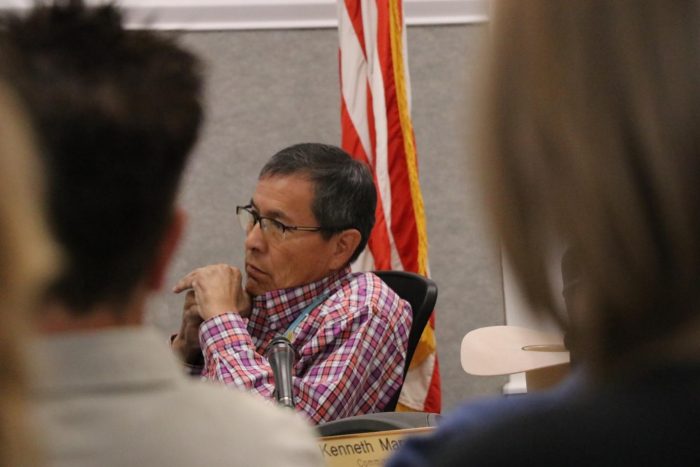
This was the exchange at that commission meeting:
Kim Henderson, San Juan County resident: Is it my understanding that you have presented these current resolutions, Commissioner Maryboy? (pause waiting for an answer) Yes?
Commissioner Kenneth Maryboy: Yes. I have.
Henderson: Where can I go to find information on who participated in the dialogue and the writing of these resolutions and who has authored them? Who has signed off on them?
Maryboy: That’s the job of (County Administrator) Kelly Pehrson and (County Attorney) Kendall Laws.
Henderson: They’re the ones who wrote them?
Maryboy: No. I said that’s where you get the answer.
Henderson: So they should have the information on that?
Maryboy: They should, and all those (GRAMA?) requests have been sent back.
Henderson: That’s an awful long process when it’s a simple request.
Maryboy: A simple request would say ‘the two commissioner as Native American … you are not … right now you’re saying that you’re too dumb to write a resolution.’ Is that what you’re saying? That’s what it comes down to.
Henderson: I deny that. That’s not what I said. I simply want to know who wrote it.
At least 23 requests for records filed under GRAMA have been generated partly as a result of the climate created by the new commissioners’ evasiveness and open hostility toward constituents and their forceful, sometimes rowdy responses.
One of those wants to find out whether Steven Boos, the new commissioners’ private attorney, is playing the role of puppet master, using text messages instead of strings. The State Records Committee has granted a hearing into an appeal of that request. It’s scheduled for September.
I’d be the first to admit that GRAMA fever is contagious. I caught it, also wanting to find out who’s pulling the strings.
Grayeyes and Maryboy offered clues about where their loyalties might lie at the outset of their terms. They prepared – or their private attorneys prepared – resolutions that reflected their long-time pro-Bears Ears National Monument activism. One rescinded all of the previous San Juan County resolutions in support of President Trump’s monument; another directed the county attorney to withdraw the county from Utah Diné Bikéyah et al. v. Donald Trump, et al., big deal national litigation to reverse the presidential proclamation that shrunk the monument by 85 percent. By approving it Maryboy and Grayeyes terminated the county’s involvement in litigation involving the nonprofit, Utah Diné Bikéyah, they had run for about eight years prior to becoming commissioners.
The November election was a coup of sorts, celebrated by regional and national media as a historical breakthrough in a rural backwater, upending what prominent Salt Lake Tribune columnists Robert Gehrke and Paul Rolly called the county’s “good-old-boys” network. The commissioners’ fellow Democrats at the highest level of the state party fully support Maryboy and Grayeyes – or at least what many Utah liberals believe they symbolize: a resurgent national movement to redress historical wrongs and expansion of Native American sovereignty. The party has even taken some of the credit for their success at the polls, according to a recent fund-raising letter signed by former chairs Daisy Thomas, Peter Corroon, Jim Dabakis, Wayne Holland, Donald Dunn, Meg Holbrook, Mike Zuhl, Dale Lambert, Pat Shea, Peter Billings and Dave Jones.
DEMOCRATIC PARTY FUND-RAISING LETTER

However, advocates of transparent and effective government within the party have been silent despite the “Effective Governance” plank of the party’s platform: “We believe good government is the foundation of a healthy society. Thus, we will strive for government that is efficient, fiscally responsible, transparent, ethical, accountable, and that puts the welfare of Utah residents above the welfare of special interest groups.” They could simply be uninformed.
Based on the commissioners’ first five months in office and previous public service, I would challenge any of their supporters on whether they have lived up to the party’s ideals.
I PRESSED ON WITH GRAMA THROUGH MEDIATION conducted on April 11 by Rosemary Cundiff, state government records ombudsman. Mediation is a voluntary attempt to resolve possible misunderstandings, find common ground and avoid a more formal hearing before the State Records Committee.
It was not successful. In fact Maryboy and Grayeyes likely never intended to do anything, according to a letter Boos wrote a week earlier.
“I am writing this letter to advise you that my communications with my clients and my fellow attorneys are not subject to disclosure under the GRAMA. I have advised my clients to not provide such private, privileged correspondence to the County, nor will I provide copies of such correspondence.”
Maryboy and Grayeyes were invited to participate. Instead they sent one of their private lawyers even though the time and place – a Utah Association of Counties conference in Provo, Utah, they apparently were scheduled to attend anyway – were chosen for their convenience. I pointedly indicated to Cundiff I would not participate if the commissioners’ lawyers were present.
“I would not be able to participate in the April 11 meeting if personal counsel of commissioners Grayeyes and Maryboy is in attendance. Likewise, I could not participate if the commissioners communicated between themselves in Navajo during the meeting. Is that something they could agree to forego during the meeting? I hesitate to make that a condition of my involvement because it might infringe on their cultural autonomy, of which I’m fully supportive,” according to emails I exchanged with Cundiff.
I chose to continue; it’s always a good idea to have a seat at the table. Perhaps there was a miscommunication. Neither the new commissioners or their private attorney who showed up, David Irvine, ever explained why they were MIA.
Boos’ letter indicates Maryboy, Grayeyes, and mediation attendees Laws, County Administrator Kelly Pehrson and County Clerk John David Nielson were sent a copy. I was not privy to it before the meeting. If any of them read the letter, they would’ve known mediation would go nowhere.
I was sandbagged.
LETTER FROM PRIVATE ATTORNEY TO COUNTY OFFICIALS, APRIL 4, 2019
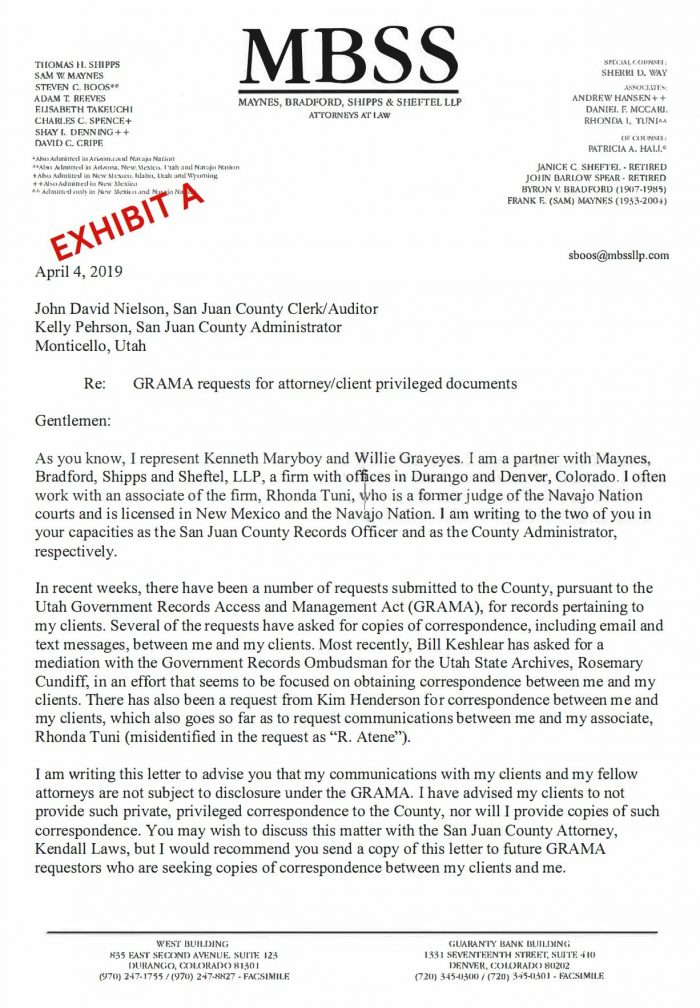
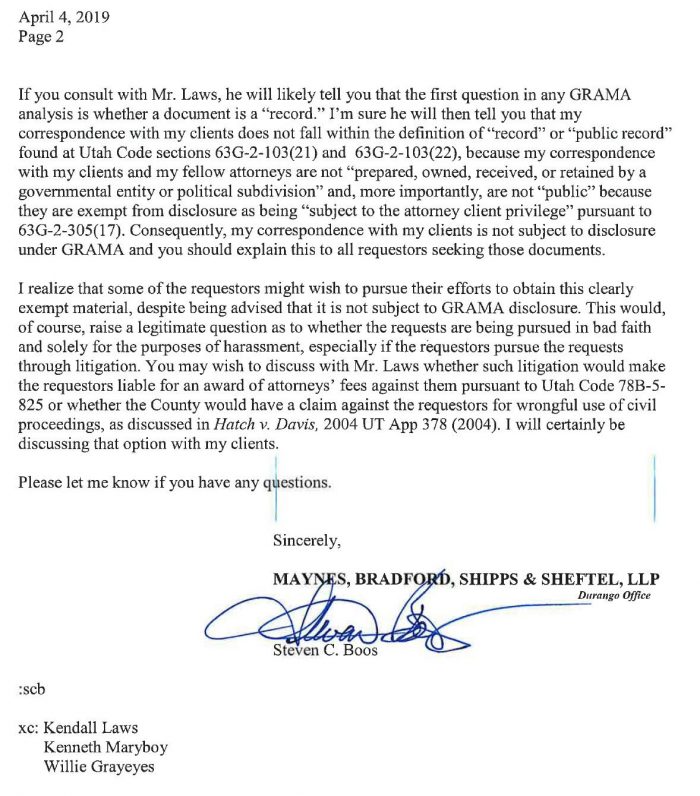
Although I took time off from my day job to prepare for a dive into the Byzantine world of governmental process and drive down to Provo, the trip wasn’t a complete waste of time. It gave me a bit of insight into the absentee governing style of Maryboy and Grayeyes. Plus, I found a good Mexican restaurant and funky downtown buzz. Well, funky for Provo.
THE NEXT STEP IN THE GRAMA ADVENTURE WAS A HEARING held a couple of weeks ago before the State Records Committee in Salt Lake City.
It went well for open records advocates; not so well for Maryboy, Grayeyes, their team of private lawyers and possibly other allies who prefer to create county policy secretly.
- The committee agreed with my definition of what’s accessible as a “public record.”
- It ordered the county to allow me to inspect records the county determines are not private communication between the commissioners and their attorneys.
- It advised the county that it had two options: comply with the order or appeal. If it fails to do one or the other, the county could be fined $500 per day.
- It cited a GRAMA provision that said a public employee who intentionally refuses to release a record when ordered to do so by the committee is guilty of a class B misdemeanor.
The hearing was recorded. It’s online.
STATE RECORDS COMMITTEE RULING, ENTERED JUNE 24, 2019





County Attorney Laws outlined San Juan’s justification for the stonewalling and was aggressively questioned by committee members. He was stuck between a rock and a hard place. Laws said he couldn’t evaluate anything he didn’t have access to. The county (in the person of its county attorney, Laws) was being stonewalled by its county commissioners who were following the advice of their Durango, Colorado-based private attorney.
No other players in this four-month adventure into the heart of Gramaland showed up – not Maryboy, Grayeyes, Boos, Irvine, Nielson, Pehrson or David Everitt, newly hired county administrator and designated GRAMA appeals guy. Apparently, they didn’t have to.
A Salt Lake Tribune reporter was there and wrote a story.
Here are highlights of what I told the committee:
I pointed out something I assumed everyone in the room could agree on: that Utahns have a constitutional right of access concerning conduct of the public’s business. To that end GRAMA promotes the public’s right of easy and reasonable access to public records and favors public access when countervailing interests are of equal weight.
In hindsight, I am not sure everyone there shared my Panglossian perspective.
I told the committee that I thought there was perhaps no environmental issue in Utah more controversial than management and use of public land in San Juan County. It has simmered for decades and most recently boiled over. It’s directly tied to expansion of Native American sovereignty, a resurgence of the so-called Sagebrush Rebellion, local, state, national and presidential politics and even religion. There is bad blood that goes back generations.
I explained that Maryboy and Grayeyes have chosen to govern through resolutions written by Boos and approved without advice or informed consent of virtually anyone in the county. Boos has either been granted or has unilaterally assumed duties normally assigned to a high-level county employee. He has written, signed and sent letters under his law firm’s branded stationery to his clients and other officials. One of those letters, dated March 12, was forwarded as the county’s only substantive responses to the GRAMA request. There’s no indication Grayeyes or Maryboy approved or even read them.
LETTER FROM PRIVATE ATTORNEY TO COMMISSIONERS MARYBOY AND GRAYEYES, MARCH 12, 2019
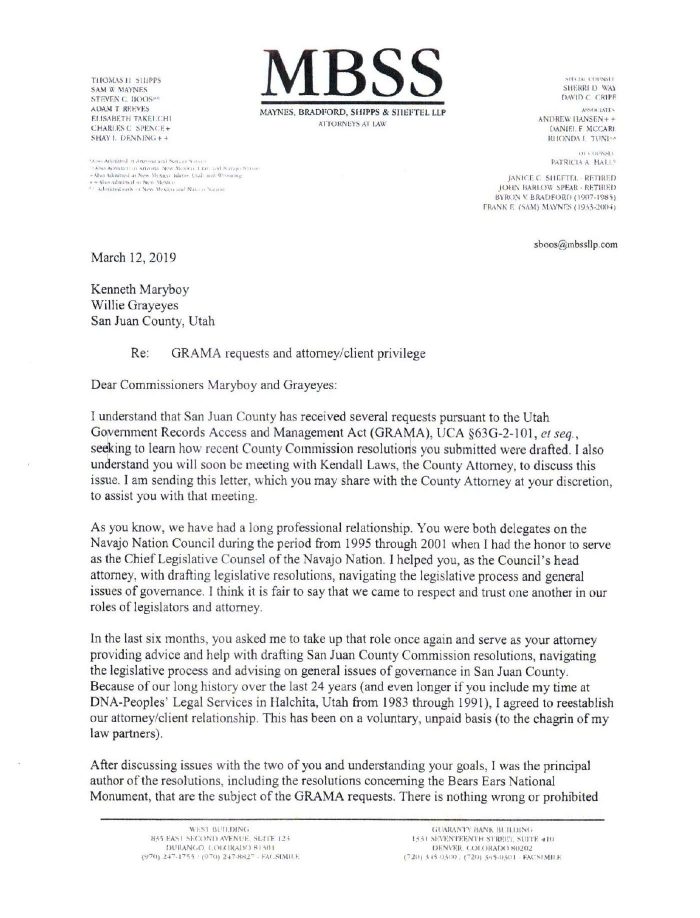
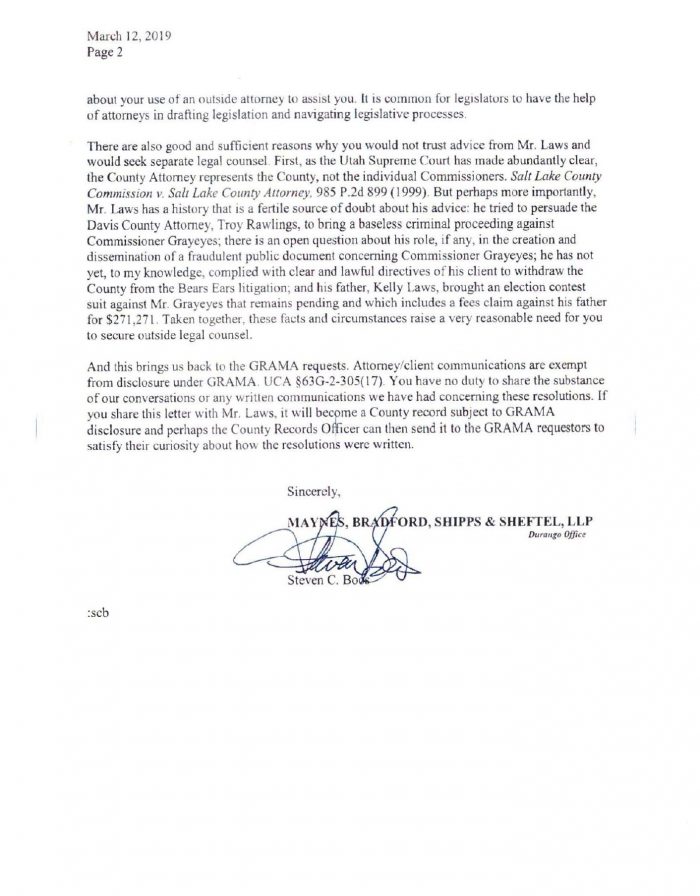
A letter dated November 29, 2019, written by Boos to Grayeyes can be likened to the tip of an iceberg; it suggests the complete story lies under the surface.
It outlines the process to remove Laws from office should he not comply with directives of the commission. Several months later a resolution was introduced to authorize the county to sue Laws and possibly oust him; it has since been tabled.
My GRAMA request seeks similar documents that so far remain under the surface, beyond public scrutiny.
Most troubling from a personal perspective is Boos’ use of bald-faced intimidation. A guy who has no formal or official ties to the county fired a lawyerly shot across my bow, presumably with the consent of his clients Maryboy and Grayeyes. But who knows? In the April 4 letter Boos wrote that requesters should heed his advice or risk litigation related to whether the GRAMA request amounts to harassment.
“I realize that some of the requesters might wish to pursue their efforts to obtain this clearly exempt material, despite being advised that it is not subject to GRAMA disclosure. This would, of course, raise a legitimate question as to whether the requests are being pursued in bad faith and solely for the purposes of harassment, especially if the requestors pursue the requests through litigation. You (John David Nielson, San Juan County clerk, and Kelly Pehrson, San Juan County administrator) may wish to discuss with Mr. Laws whether such litigation would make the requestors liable for an award of attorneys’ fees against them pursuant to Utah Code 78B-5- 825 or whether the County would have a claim against the requesters for wrongful use of civil proceedings …”
I was specifically named in the letter as a “requester,” as was Kim Henderson, a vocal critic of the new commissioners. Her interaction with Maryboy is cited above.
I concluded my presentation by the telling the committee I was concerned that if San Juan County prevails possibly precedent-setting questions follow:
- Does GRAMA have any value if an elected official can route all policy considerations through a team of personal attorneys then successfully claim attorney-client privilege?
- Are the commissioners and their legal team for all practical purposes removing an important tool enacted by the Legislature that even ordinary Utahns can access to hold their elected representatives accountable?
- Will efforts of ordinary Utahns be further stifled if faced with veiled threats by personal attorneys acting as proxies of those elected officials?
- Should a GRAMA appeals officer, such as Everitt, who works at the pleasure of commissioners, be expected to press his bosses to comply with records requests, especially those that might reveal embarrassments or illegal activity?
When David Fleming, a member of the committee, asked Patricia Smith-Mansfield, also on the committee, what the county (presumably in the person of Laws) should do now that it hasn’t already done, she minced no words: “They should take the order and say, “Look, you got to give them (the records) up.”
The State Records Committee’s order raises other questions for the county and possibly a state district court to answer in the coming weeks and months:
- Would the county prosecute two of its commissioners to force compliance? Committee members were skeptical.
- Would commissioners Grayeyes and Maryboy risk a conviction to keep their early motivations secret? If so, what are they hiding?
- What would be the response of San Juan County voters if they or the county’s insurance company have to pay fines of up to $500 per day or state district court costs, all because of their new commissioners’ stonewalling?
Personally, it’s comforting to know that GRAMA allows requesters to be awarded court costs should they win, and I’ve been pleasantly surprised that several prominent attorneys have expressed an interest in offering their services should this adventure end up in court.
The onus is on the county, which must respond within 30 days to the order “stating they’ve complied with it or they will challenge it. If they don’t do either one, we can respond,” according to Smith-Mansfield.Some journalists, historians, university researchers, librarians and archivists of government records have a sense of the importance of historical documentation.
If anyone at the State Records Committee hearing understood the significance of access to public records related to preparations for governing made by two Native Americans newly elected as a majority on the San Juan County Commission, it was Smith-Mansfield. She was longtime director of Utah State Archives and Records Service until last year and the person whose expertise was sought by others on the committee.
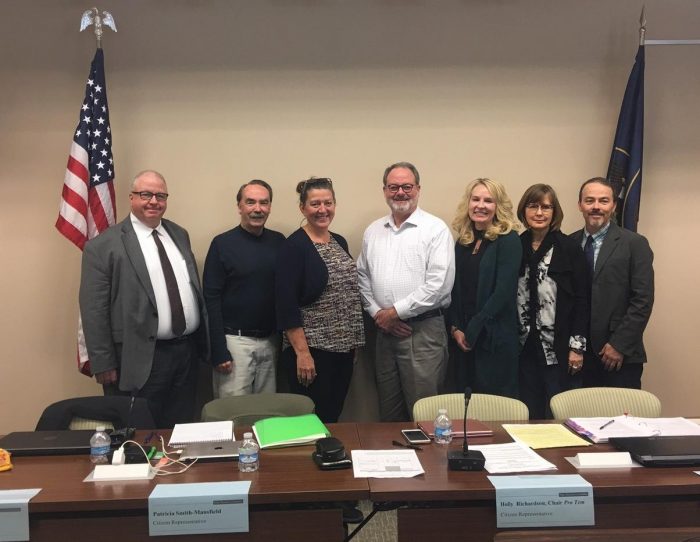
Bill Keshlear is a frequent contributor to the Zephyr. He has about 30 years of experience, working as a newspaper editor, writer and designer. He has dabbled a bit in politics, working as communication director of the Utah Democratic Party during the 2008 Obama election cycle and helping run the 2016 campaign of a candidate seeking a spot representing San Juan County in the Utah Senate, including the Utah portion of the Navajo Nation.
To comment, scroll to the bottom of the page.
Don’t forget the Zephyr ads! All links are hot!

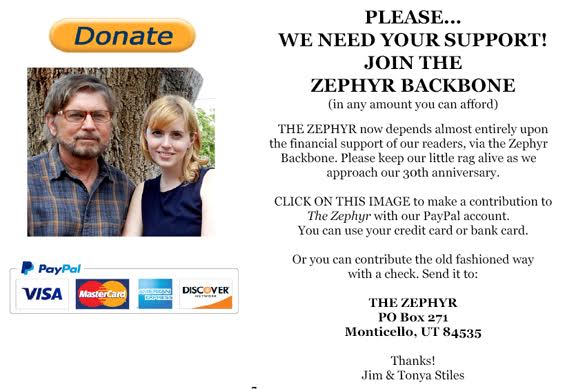





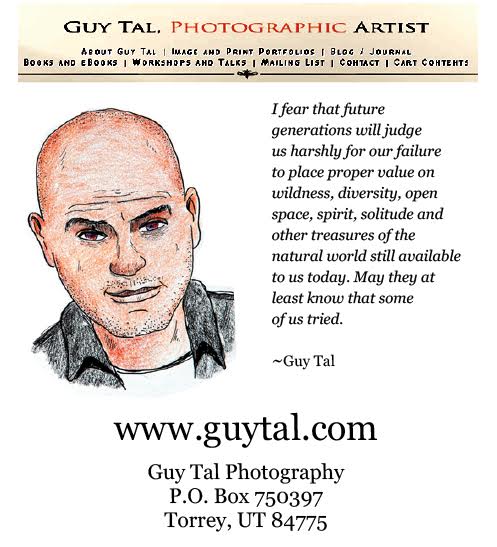

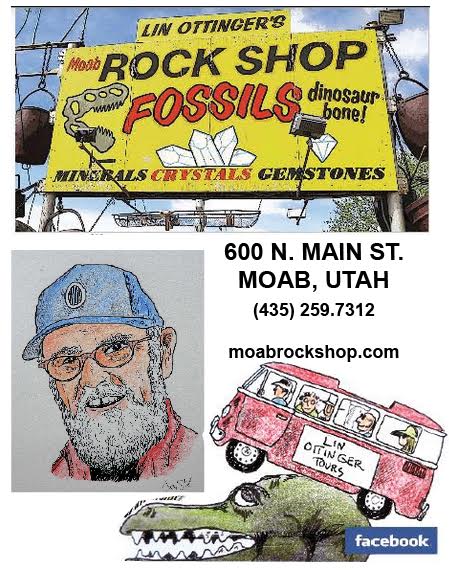

This has been on a voluntary unpaid basis ( to the chagrin of my law partners) REALLY???? That needs to be looked into.